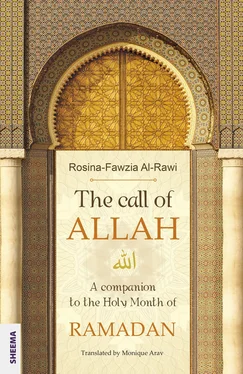You will find it helpful to set an alarm on your phone or on your alarm clock every 55 minutes.
A teacher once told his students: “Keep knocking on Allah’s door and never stop, for in His mercy, Allah will finally open His doors to those who sincerely seek Him.”
The mystic Rabia Al-Adawiyya heard him as she was passing the mosque, and asked: “Was Allah’s door ever closed?”
DID YOU KNOW…
The first ādhān (literally: announcement) in the history of Islam came to ʿAbd Allah ibn Zaid as an inspiration in a dream, approved by the Prophet  and called for the first time by Bilal al-Habashi in 623, shortly after the exodus, hijra, from Mecca. For the Shi‘ites, the angel Gabriel was ordered by Allah to come to the Prophet
and called for the first time by Bilal al-Habashi in 623, shortly after the exodus, hijra, from Mecca. For the Shi‘ites, the angel Gabriel was ordered by Allah to come to the Prophet  with the call for prayer. The Prophet
with the call for prayer. The Prophet  then appointed Bilal as the first muezzin.
then appointed Bilal as the first muezzin.
2 ndday of Ramadan
TAQWA
GOD-CONSCIOUSNESS

The Prophet Muhammad  said: “Have taqwa of Allah wherever you are, and follow an evil deed with a good one to wipe it out, and treat the people with good behaviour.” 12
said: “Have taqwa of Allah wherever you are, and follow an evil deed with a good one to wipe it out, and treat the people with good behaviour.” 12
The word taqwa is often translated as fear, yet taqwa is being conscious of God, afraid of not being connected with Allah and at the same time loving to be with Him.
It is a protection, a bond, an attitude and an inner guidance which comes from feeling and knowledge: inna li-llāhi wa-inna ilayhi rāji‘ūn, “ Verily, unto God do we belong and, verily unto Him we shall return.” (2:156)
The deep certainty that I belong to Allah, that every blessing I enjoy, every one of my experiences and possessions, everything that I am comes from Him, opens the heart and enables me to step out of the fear and the worries which keep arising in life, and to grow and develop trust, faith and surrender.
When the heart places itself more and more in Allah’s hands and experiences its peace, sakīna, in God’s presence, the light of the heart begins to conquer the intellect and to spread to the senses and perceptions.
Our dignity, our inner beauty and our compassion towards self and others grow out of this inner attitude. It helps us to live to the full the potential given to us by Allah and to experience the true freedom of our soul.
Ittaqi llāh ! Take heed of God wherever you tread!
When we know deep in our heart that there is a Creator, we will make our decisions in such a way as to be beneficial to God’s creation and to treat it with kindness.
Being aware of God’s existence at all times and in all places leads us to draw this knowledge, this deep feeling, into every decision we make, not out of fear, but out of love, deference and self-respect.
For only when we trust in the Divine and become Allah’s servants does our soul experience Allah’s beauty. Then we can live the innate goodness, fiṭra , which Allah has placed in our hearts and which blossoms when we are in alignment with the Divine.
The blessed month of Ramadan is a special time that Allah bestows upon us so that our heart may turn away from the world’s ceaseless wishes and focus on His eternal love.
It is a month during which we align ourselves anew with Allah, expressing this in our deeds, our words and our behaviour, for “verily, the best of all provisions is God-consciousness .” (2:197)
Thus does our faith in Allah manifest in our life.
“Verily, those who attain to faith and do righteous deeds will the Most Gracious endow with love: […].” (19:96)
Ramadan is a month of trust and courage. Only when we know, when we hold our heart to Allah can we experience how much God loves us; only then can we become free of our fears and dread of the unknown future.
The more we trust in God’s perfect wisdom, the more harmony we feel in our life, the more we embody this conviction on our path and in our aims.
It is this mixture of reverence, trust, mindfulness and love which enables us to come into the state of dignified and mindful behaviour, adab. And taqwa helps us embed ourselves in the natural movements and laws of life and the universe.
Taqwa is an inner attitude which relates to our soul and builds the meeting point between surrender and freedom.
Taqwa helps us become responsible human beings and a conscious part of the Divine creation with rights and obligations.
Taqwa makes us free inside because we find our bearings through an inner attitude which makes up our character.
“Verily, the noblest of you in the sight of God is the one who is most deeply conscious of Him.” (49:13)
Taqwa gives us orientation, discernment and the ability to decide, as well as steadfast courage, thus helping us to be friendly and compassionate, without judgement.
PRACTICE SUGGESTED FOR TODAY
Today, decide to become aware that everything you touch, everything you see, everything you carry, everything you buy and prepare, every encounter, everything you hear and smell, comes from Allah and that He is the Mālik, the One who rules over and owns everything.
Repeat:

lahū l-mulk wa lahū l-ḥamd
Everything on earth comes from You and belongs to You,
praise be to You
DID YOU KNOW…
The concept taqwa, including the corresponding verb and derivatives, occur 285 times in the Qur’an, thus showing how essential this attitude is for us.
The same root w-q-y also carries the following meanings: to be on one’s guard, caution, to protect, to preserve, to take a preventive measure, defence.
3 rdday of Ramadan
ṢALĀT
PRAYER

Al-Mughira bin Shu‘ba narrated: “The Prophet used to pray so much that his feet would become swollen, and when he was asked as to why he prayed so much, he would say, ‘Shall I not be a thankful slave to Allah?” 10
One day Imam Ali asked, “Which verse of the Qur’an gives you most hope and trust?”
One man in the congregation said, “Verily, God does not forgive the ascribing of divinity to aught beside Him, although He forgives any lesser sin unto whomever He wills.” (4:48)
Imam Ali answered, “It is a good deed, but this is not the one.”
Another man spoke, “Yet he who does evil or [otherwise] sins against himself, and thereafter prays God to forgive him, shall find God much-forgiving, a dispenser of grace.” (4:110)
Imam Ali answered, “It is a good deed, but this is not the one.”
A third man spoke, “[Thus speaks God:] ‘O you servants of Mine who have transgressed against your own selves! Despair not of God’s mercy: behold, God forgives all sins – for, verily, He alone is much-forgiving, a dispenser of grace!’” (39:53)
Читать дальше

 and called for the first time by Bilal al-Habashi in 623, shortly after the exodus, hijra, from Mecca. For the Shi‘ites, the angel Gabriel was ordered by Allah to come to the Prophet
and called for the first time by Bilal al-Habashi in 623, shortly after the exodus, hijra, from Mecca. For the Shi‘ites, the angel Gabriel was ordered by Allah to come to the Prophet  with the call for prayer. The Prophet
with the call for prayer. The Prophet  then appointed Bilal as the first muezzin.
then appointed Bilal as the first muezzin.
 said: “Have taqwa of Allah wherever you are, and follow an evil deed with a good one to wipe it out, and treat the people with good behaviour.” 12
said: “Have taqwa of Allah wherever you are, and follow an evil deed with a good one to wipe it out, and treat the people with good behaviour.” 12












